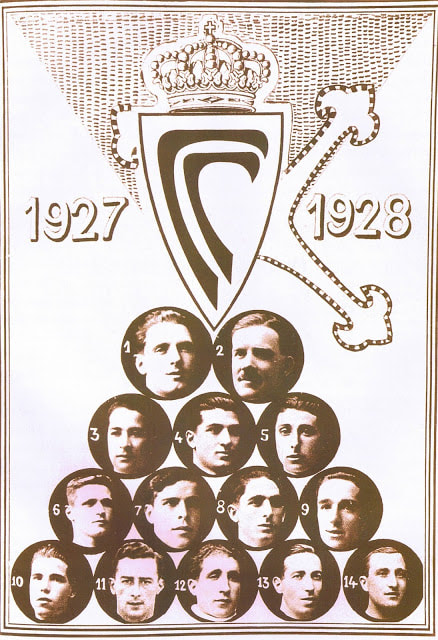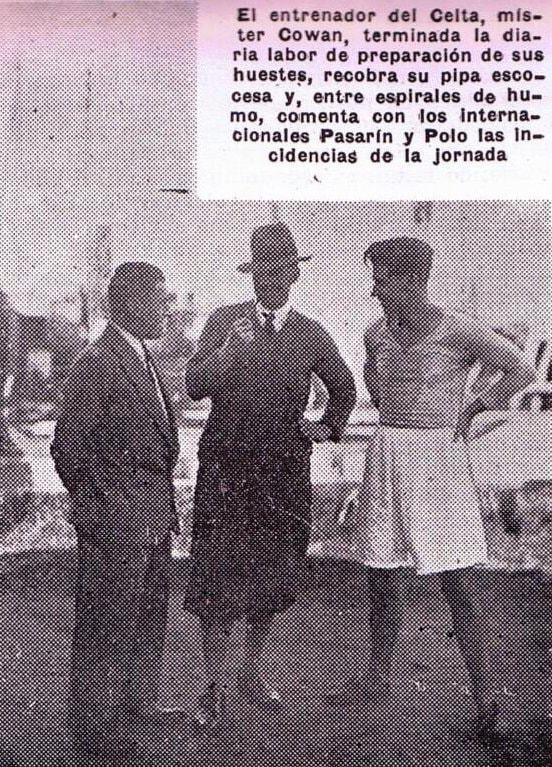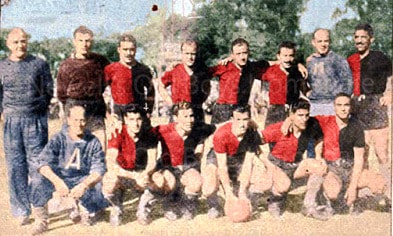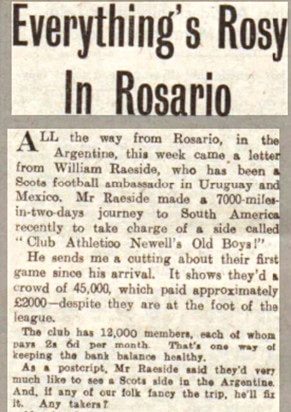I first came across him when I wrote my recent blog about the Scottish players who spent the 1946-47 season in Mexico. He has a fascinating story, but working out Raeside's football career has proved quite a challenge: he changed his name, knocked years off his age, exaggerated his achievements and had long periods out of football.
I can find no record of Raeside until he was announced in the summer of 1927 as the new coach of Celta Vigo in north-west Spain. He was then aged 35 and the club outlined an impressive background as player and coach: 'He played for 11 years with Hibernian, South Shields, Darlington and others. Later he was trainer of Hibernian and then, as a professor of athleticism for Charles Durning at St Mirren. He was instructor at Glasgow University and then trainer of four Norwegian clubs – one of whom he took to the final of the Norwegian championship. He comes with excellent references, including from Celtic and Motherwell.'
The trouble is, I have been unable to verify any of these claims, or indeed any football pedigree as player or trainer. There is perhaps some truth in it, for example he may well have been an assistant to Charles Durning, who was trainer of St Mirren 1911-19 and subsequently athletics coach at Glasgow University, but there is no hard evidence. He certainly didn't make any first team appearances as a player.
Yet what makes his story particularly curious is that Raeside took the Celta Vigo job under a false name, WH Cowan. And that takes some explaining.
Born in Paisley in 1892, William Raeside was brought up in the city, where he worked as a steel cutter, which probably saved him from being called up in the first war. He married Jane Gerrard in 1911 and they had two daughters.
However, he separated from his wife and by 1920 was living in Edinburgh when he fathered the first of five children by Jessie Cowan Scobie. Her middle name is significant as he used it to change his identity, and perhaps to evade his first wife, who divorced him in 1928 claiming 'address unknown'. At the time, he was coaching Celta Vigo as WH Cowan, and later that year he had a son who was registered with that surname, and Raeside even signed the register as William R Cowan. That subterfuge was only corrected years later, in 1946, with the aid of a sheriff.
Following his year in Vigo, Raeside returned to Glasgow to work as an accountant, reverted to his own surname and married Jessie in 1930. Throughout this time, he was described on all the birth and marriage certificates as a clerk or accountant. Interestingly, however, on similar certificates relating to his children, many years later, his occupation was given as football trainer or athletic coach. It is a good example of how family records can help to build up a life story with their snippets of information.
There is no record of Raeside having any further football involvement until the summer of 1937, when Millington Drake, a British diplomat in Montevideo, was asked by the president of Nacional to find him a coach who would improve Uruguayan football 'by the influence of English technique and training systems.' Somehow Drake was put in touch with Raeside, whose ability to speak Spanish must have helped, and he duly crossed the Atlantic in November 1937 to take up the position.
He spent a year coaching Nacional, assisted by Hector Castro, a World Cup winner with Uruguay in 1930, and they are credited with laying the foundations for the great Nacional team which Castro led to five straight championship titles. The first signs of that success came early in 1938 when Nacional won the Gold Cup, formally known as the Torneo Internacional Nocturno, played between the ten best teams from Montevideo, Buenos Aires, Rosario and La Plata. It included a memorable 2-1 away win at Estudiantes on 19 February 1938, in a bitterly hostile atmosphere known as 'the match of the bloodstained shirts'.
Raeside (also known as Reaside) decided to return home in October 1938, reportedly to become a scout for Arsenal, prompting mass demonstrations from fans who wanted him to stay.
In 1947 he was on the move again, this time to Argentina, taking charge of Newell's Old Boys in Rosario. It was not a great success as Newell's did not win any of their first ten games, in fact they only won seven out of 30 all season, and ended the season in 11th place in the Argentina Primera Division.
He appears to have suggested recruiting Scottish players, as in 1948 Newell's had three Scots in their ranks: Willie Kilpatrick (ex-Chelsea, Dunfermline and others) was joined by two inexperienced juniors from Renfrew, Stewart McCallum and Donald McDonald. Former Celtic striker Joe Rae also signed up but then bought himself out of the contract. By all accounts, the Scots were not a great success, but by then Raeside had returned home.
For the first time in his career, he secured a management post in the UK, taking charge of Cheltenham Town in the Southern League for the 1952-53 season, and then had a short final stint across the Atlantic, as technical director of Atlante in Mexico City in the autumn of 1953.
Back in Scotland, in August 1954 he applied to be Dundee United manager but the job went to Reggie Smith, and that appears to be the end of Raeside's football career. He retired to Old Kilpatrick, west of Glasgow, and died there in 1964.
There are many frustrating gaps in William Raeside's life story. Most notably, how did he get that first job with Celta Vigo in 1927 – did he really have a coaching background? He seems to have slipped under the radar for much of his life, but there is no doubt he led a fascinating career and I would love to find out more.
William Raeside, also known as WH Cowan and William Reaside: born 24 March 1892 in Paisley; died 15 November 1964 in Old Kilpatrick.
With thanks to the following sources:
Celta Vigo: http://yoentrenealcelta.blogspot.co.uk/2013/04/wh-cowan.html
Nacional: http://www.nacionalenargentina.com.ar/una-gesta-unica-y-heroica-el-campeonato-nocturno-rioplatense/
Newell’s Old Boys: http://anotandofutbol.blogspot.com/2018/02/newells-old-boys-parte-2.html
Newell’s Old Boys: https://nobhomenaje.blogspot.com/2017/05/quinteto-ofensivo-1947.html
Chivas Guadalajara: https://www.facebook.com/Datos.Chivas/
British Newspaper Archive: https://www.britishnewspaperarchive.co.uk/
The anecdote about Millington Drake in 1937 is from Scoring for Britain by Peter J Beck (1999).




 RSS Feed
RSS Feed